This post was updated Aug. 6 at 7:51 p.m.
Students and employees across the UC expressed dissatisfaction with University administration during the UC Board of Regents meeting last week.
Speakers during the July 17 public comment session of the regents meeting voiced concerns about what they deemed to be a misallocation of funds and employee underpayment, as well as the University’s response to the Palestine solidarity encampment at UCLA. Around 60 members of United Auto Workers Local 4811 also rallied outside the UC San Francisco campus that day to protest the unfair labor practice charges that the union filed against the UC in May.
[Related: United Auto Workers Local 4811 announces strike authorization vote]
The union – which represents academic student employees, graduate student researchers, academic researchers and postdoctoral researchers – claimed in its unfair labor charges that the UC failed in its responsibility as an employer when it allowed police to use force on members during the May 2 sweep of the UCLA Palestine solidarity encampment. In response, members of UAW Local 4811 went on strike in May. However, on June 7, an Orange County Superior Court issued a temporary restraining order in favor of the University, which had argued that the strike was illegal – effectively ending the strike.
To resolve these unfair labor practices, the UC could provide amnesty for those who were arrested or faced discipline from the UC for participating in pro-Palestine protests across the UC, in addition to negotiating with members to enact new free speech policies for workers, according to the union’s website.
Emily Weintraut, the UC Davis academic student employee unit chair and a food science graduate student, said she attended the protest to demand the resolution of the unfair labor practices that led to the UAW Local 4811 strike in May.
“It’s a pattern from the University. Every time we take any sort of action, they threaten discipline – and they’re doing that again,” Weintraut said. “The main crux of it is that it’s union-busting behavior.”
Protesters marched to the entrance of the UC Regents meeting, where they circled and chanted while holding signs that read, “Drop all charges.”
Wednesday’s rally had three speeches from members of UAW Local 4811, including one from Weintraut.
In another speech, UCSF academic student employee unit chair Nicholas Freitas said the UC has a history of violence, citing the April 30 attack by counter-protesters on the first Palestine solidarity encampment at UCLA. While Vice Chancellor for Strategic Communications Mary Osako said law enforcement had been called for “immediate support” at 12:12 a.m. May 1, police did not arrive until more than two hours later.
“They let counter-protesters incite violence as the police stood by at UCLA,” Freitas said. “Then, they had the police violently arrest protesters and discipline students for even being there.”
Multiple UCLA students also voiced their concerns about administrative actions during public comment before the board July 17.
UCLA Graduate Student Association President Noor Nakhaei said she was concerned about the University’s response to pro-Palestine protests, adding that she believes administrative actions have hurt students’ trust in University administration.
She added that the University’s restraining order against UAW Local 4811 following the union’s strike was reactionary, and she encouraged dialogue between University administration and students.
Javier Nuñez-Verdugo, the external vice president of the UCLA Undergraduate Students Association Council, criticized what they called the UC’s “systemwide militarization” against pro-Palestine protesters.
They alleged that law enforcement on UC campuses has profiled some students for being Black or wearing a keffiyeh – a headscarf that has served as a symbol of Palestinian liberation. Nuñez-Verdugo also said that when these grievances were brought to administration, they were met with redirection.
“I call upon you, the UC Board of Regents, to please reconsider the response of increased policing, harsh no-tolerance policies regarding student protests and other means of suppressing free speech through our campus channels for the new year coming in the fall,” they said.
Former USAC Transfer Student Representative Thyra Cobbs – who also served as the vice chair of the UC Student Association’s Racial Justice Now! campaign and said she led a campaign for academic reparations for Black students – criticized the UC Office of the President for its refusal to consider creating an endowment fund to improve retention rates among Black students.
“I would highly encourage you all to do your salaried jobs and properly address the needs of Black UC students,” Cobbs said.
Members of the Board of Regents – aside from the president of the UC and the student regent – do not and cannot receive compensation for their service on the board, according to the board’s bylaws.
Namrata Deepak, a rising third-year linguistics and anthropology and political science student at UCLA, encouraged the regents to “center student and faculty interests” when revising Item J2, which passed later during the meeting. The item prohibits academic departments from posting political messages on their website homepages.
“The administration of UCLA has broken the trust of me and countless other students after allowing and ordering violence against peaceful student protesters,” Deepak said. “If I cannot trust UCLA to protect the safety and well-being of students at such a crucial moment, how am I to trust their intentions in deciding which discretionary statements are allowed and who is allowed to say them?”
Multiple members of the American Federation of State, County and Municipal Employees Local 3299 – which represents service, patient care, technical and skilled craft workers employed by the University – criticized the UC’s approach to bargaining efforts between the University and the union.
In early July, the University introduced a new wage plan for members of AFSCME Local 3299, which would include successive pay increases for members over the course of five years. Under this proposal, the University said the union’s lowest-paid employees would receive $25 per hour by July 1, 2025.
Carmen Lee, an auto equipment operator for the UC and executive board member for AFSCME Local 3299, said she was disappointed by the University’s offers at the bargaining table.
Lee criticized increases in health care premiums and parking costs, adding that she struggles financially with the wages she receives from the University.
Rukhsana Ansari, another speaker at public comment, called upon the UC to dedicate more resources to the systemwide collegiate recovery program. Ansari, the mother of a deceased UC Berkeley student, said her son died in May as a result of an accidental fentanyl overdose after taking a counterfeit drug that he thought was Adderall – a nervous system stimulant used to treat those with ADHD and narcolepsy.
“The worsening fentanyl crisis had a direct impact on us and the UC student community,” she said.
Public comment concluded Wednesday with a UC alumnus who claimed they had been “vilified and targeted” by the University for being an Arab student.
“I didn’t feel unsafe,” they said. “I was unsafe.”
The alumnus went on to accuse the University of brutalizing students of color, committing wage theft and calling United States Customs and Border Patrol on undocumented students. They added that they believe the University is profiting off of a genocide against the Palestinian people.
As their comments exceeded the allotted one minute, the microphone was cut. However, they continued to criticize the University and the regents.
Board Chair Janet Reilly thanked those who attended the meeting and those who made comments over the phone for their time following the end of public comment.
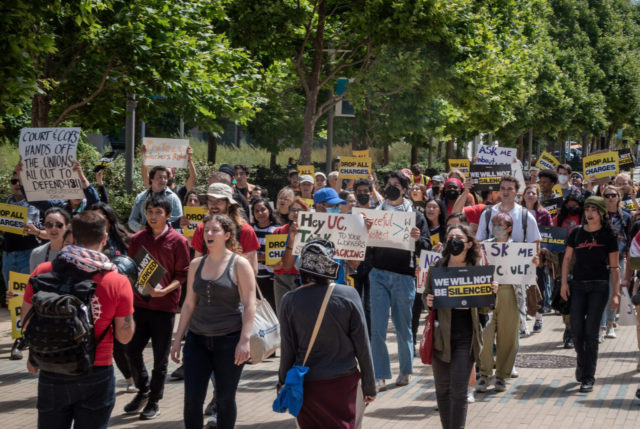

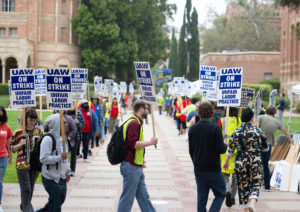
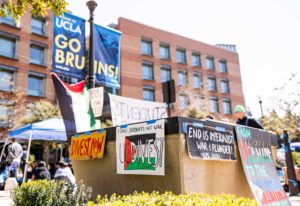
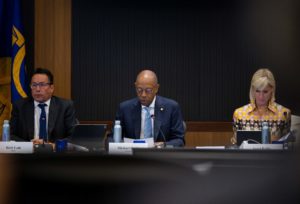
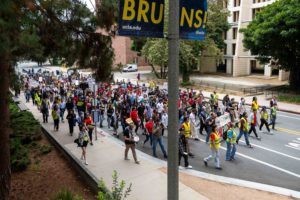
Comments are closed.